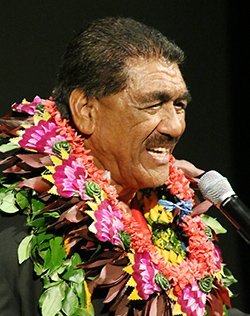
Junior Ah You during the Polynesian Football Hall of Fame enshrinement Program
While the Polynesian Football Hall of Fame inducted Junior Ah You into its class of 2017 during an enshrinement ceremony on January 21, 2017, at the Polynesian Cultural Center, it’s the large Samoan’s decades of serving the people of his home with “aloha” ever since he retired from professional football in 1983 that truly demonstrates his championship character.
Granted, Ah You played football so well that the most recent PFHOF recognition is his fourth hall of fame honor; but his trail to glory on the gridiron started in the small communities surrounding Laie.
Samoan Roots
His late parents, Miki and Mele Ah You, immigrated here from Faleniu, American Samoa, in 1960, to provide their children with better educational opportunities and to be close to the Latter-day Saint temple. The Polynesian Cultural Center hadn’t been built yet, but the whole family quickly got involved in helping at the popular Laie Hukilau, that Mormon church members had been putting on since 1948 as a fund raising event and is the namesake of the PCC’s Hukilau Marketplace. When the Center opened, Ah You became one of its original employees and eventually a featured Samoan fire knife dancer.
But surprisingly, Ah You describes himself as an “awkward” boy back in those early days. “I was just a clumsy kid at Laie Elementary School. I didn’t know how to dribble a basketball,” he said during his remarks at the PFHOF enshrinement program.
A Special Blessing
Typically, Ah You credits others for his success in sports, starting with his grandparents, Savea Aupiu and Talalupelele Moe, who served as local missionaries in Samoa for 50 years before being among earlier members of the extended family to move to Hawaii. Then, Ah You recalled, before his grandparents moved on to California “all of us cousins were taken to my uncle’s house in Honolulu to receive a spiritual blessing from my grandfather, who was a spiritual giant in my family. One by one each of the cousins went in to get this special blessing from this special man.”
Ah You said he vividly remembers his grandfather blessed him “that if I stayed close to God” and was faithful in observing Latter-day Saint gospel principles, “that I would be very successful in sports. I remember thinking I didn’t know how to play anything, and he’s telling me that I’m going to be successful in something that I knew nothing about.”
Football Star
The promise of the blessing soon began to bear results: Ah You started playing Pop Warner football, which was then headquartered locally in nearby Hauula. By the time he became a Kahuku High Red Raider, he dominated the defense as a linebacker and also starred on the basketball team in the off-season. Next, he was given a full-ride scholarship to Arizona State University in Tempe, where he was a three-time All-Western Athletic Conference player and a 1972 All-American.
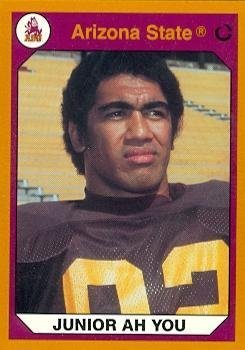
Junior Ah You Arizona State Football Card, 1990
In fact, during half-times in the Sun Devil Stadium, the team also featured Ah You doing the Samoan fire knife dance; and more recently ASU named him to its sports alumni “ring of honor” in 2012. Likewise before leaving Tempe, Ah You would also help put on luaus where he would do the Samoan knife dance to help Latter-day Saint congregations in the Intermountain region raise funds during those days.
With his strong Mormon faith, some may wonder why Ah You never got recruited to play for BYU in Provo, Utah. Family friend Vai Sikahema — who did play for BYU in the 1980s and went on to become the first Tongan in the National Football League — pointed out that the late BYU head coach LaVell Edwards once told him he simply fumbled the ball.
“When LaVell found out that Junior was not only Mormon but wanted to come to BYU, and they didn’t recruit him, he decided that would never happen again. He finally began recruiting hard on the north shore [of Oahu] because Junior terrorized BYU’s quarterbacks back in the old WAC [Western Athletic Conference] days.” Sikahema added that Ah You’s brother, Sale (Charles), sons, and other family members have long-since been part of the Polynesian pipeline to BYU and other universities on the U.S. mainland.
The Big Leagues

Ah You, #77 for the Montreal Alouettes
After graduating from ASU and being drafted by the NFL, Ah You decided to accept an offer from the Canadian Football League’s Montreal Alouettes, where he spent the majority of his pro career as a linebacker, for which he was named the 1974 Grey Cup most valuable player. He was also one of the CFL’s Top 50 players in the league’s modern history, which is among the reasons the Alouettes retired his #77 jersey, just one of seven to be so designated.
A Life of Service
Following a couple of final seasons playing for the United States Football League, Ah You and his young family retired back to Laie where — along with lots of relatives — they quickly took the lead in rendering community service and providing leadership.
Examples include sponsoring a free, ongoing New Year’s Day “concert of stars,” putting on sports tournaments during the annual Laie Days celebration each July, feeding the homeless and elderly at their family restaurant in nearby Kahuku — including Thanksgiving and Christmas feasts that include all the senior Latter-day Saint service missionaries in the area, putting on luaus for various groups at Hukilau Beach, and providing refreshments at community and civic events.
Of this, one community member recently said, “It is impossible to understate just how much Junior and his family do for the community.” For example, he has been consistently elected to the Laie Community Association’s board of directors now for over 30 years, most of that time serving as vice president of community relations.
Despite all of his achievements and service, Ah You typically shuns attention and is usually found working in the background, often cooking for hundreds of people. Why you may wonder? Oldest son Kingsley Ah You explained that his father was “uncomfortable” with the limelight “because he doesn’t like to be honored.”

Tita’s Grill, owned and operated by the Ah You Family, serves a free breakfast during a service project in Laie
To read a story regarding a service project Junior supported with a free meal to the volunteers, as well as the opening to his newest food venue at the Hukilau Marketplace, CLICK HERE!
Well Deserved Recognition
Still, during the Polynesian Football Hall of Fame enshrinement program the elder Ah You shared some of the things that have motivated him in sports and community service:
“Today, after my career in high school, college and the pros, I want to say to my grandpa, I did it…. and I want to thank my mom and dad for raising all of us in such a loving, spiritual way. Whatever we are, we became in trying to follow our parents’ example.”
Ah You also thanked his coaches and those in the audience who played football with him through Pop Warner and high school. “I’m here to represent my family and my community. All of you are my ‘ohana.’ I’m here as your faithful servant. Wherever I went, I was proud to say where I came from.” He also thanked his siblings and other relatives who came from the mainland. “I’m going to be cooking for a long time until they go home,” he joked.
But he saved his most emotional thanks for his immediate family. “My children and my family mean the world to me, and all my dear friends. They are all an inspiration to my life,” Ah You said.
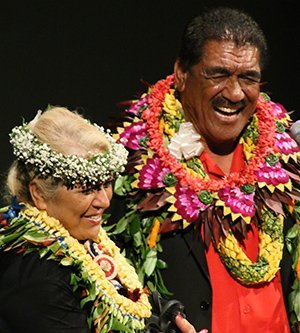
Junior Ah You and his wife, Almira. They were high school sweethearts and early PCC performers.
Then he asked his wife, Almira, to join him at the microphone and recognized her “as the person who deserves credit for whatever good I’ve accomplished, the rock in our family. Not once has she yelled at me. She has loved me unconditionally, like my Savior, in spite of my imperfections and many short-comings. She’s an unbelievable woman.” Turning to her, Ah You said, “I’m grateful to your parents for raising you.”
“We were high school sweethearts,” he said, adding a bit of Polynesian fun: “Now look at us. They call us the beauty and the beast. I’m so grateful my kids look like her.”
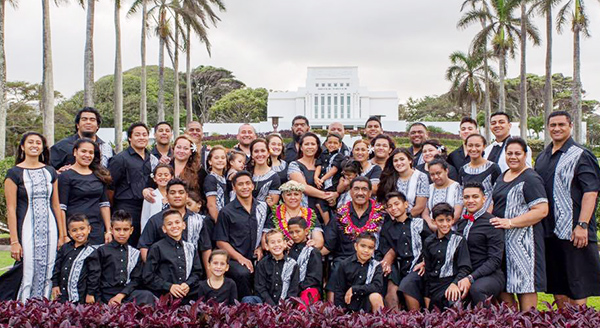
Ah You (with red lei), next to his wife Almira, and surrounded by their children, grandchildren and some of their extended family members.
Story and images by Mike Foley
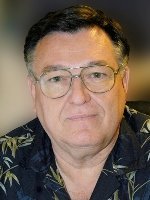
Mike Foley, who has worked off-and-on
at the Polynesian Cultural Center since
1968, has been a full-time freelance
writer and digital media specialist since
2002, and had a long career in marketing
communications and PR before that. He
learned to speak fluent Samoan as a
Mormon missionary before moving to Laie
in 1967 — still does, and he has traveled
extensively over the years throughout
Polynesia and other Pacific islands. Foley
is mostly retired now, but continues to
contribute to various PCC and other media.

Recent Comments